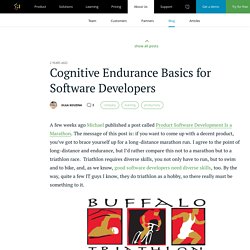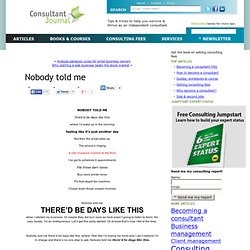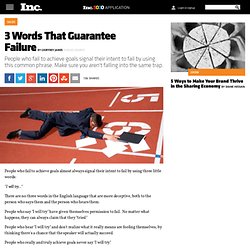

The Nine Ways To Destroy Your Life and Everyone Around You. Cognitive Endurance Basics for Software Developers. A few weeks ago Michael published a post called Product Software Development Is a Marathon.

The message of this post is: if you want to come up with a decent product, you’ve got to brace yourself up for a long-distance marathon run. I agree to the point of long-distance and endurance, but I’d rather compare this not to a marathon but to a triathlon race. Triathlon requires diverse skills, you not only have to run, but to swim and to bike, and, as we know, good software developers need diverse skills, too. By the way, quite a few IT guys I know, they do triathlon as a hobby, so there really must be something to it.
As in triathlon, diverse skills needed to develop a software product require that you keep up your endurance with all of them, learning to alternate your activities, such as coding, researching, coming up with solutions and empathizing with others while keeping a workable race rate. . The insidious sources of cognitive bummers can be broken down into 3 groups: Process-related. Embrace Work-Life Imbalance - Tomas Chamorro-Premuzic. By Tomas Chamorro-Premuzic | 9:00 AM February 12, 2013 Why is everybody so concerned about work-life balance?

According to one urban legend, based on 1950s pop psychology*, workaholics are greedy and selfish people who are bound to die from a heart attack. Not really. As the great David Ogilvy once said: “Men die of boredom, psychological conflict, and disease. They do not die of hard work.” Most of the studies on the harmful effects of excessive work rely on subjective evaluations of work “overload.” 16 Simple Rules for Living a Successful Life. Is your day-to-day life full of stress and chaos?

Are you scrambling to find a peaceful moment in the day when you can put your feet up and relax? Are you rushed, stressed out and ready to call it quits. Hijack! How Your Brain Blocks Performance. Nobody told me. InShare4 there’d be days like this.

Want People to Return Your Emails? Avoid These Words [INFOGRAPHIC] Next time you write an email subject line, think twice about the words you're using.
![Want People to Return Your Emails? Avoid These Words [INFOGRAPHIC]](http://cdn.pearltrees.com/s/pic/th/people-return-infographic-23003157)
Loading your message with words such as "confirm," "join," "press," or "invite" is not a good idea if you want a response, says data from Baydin, the makers of email plugin Boomerang. Baydin recently extracted data from five million emails its users handled — either using the company's "email game" or scheduled for later via Boomerang. It found that some subject-line words, such as "apply" and "opportunity," got more responses than words from the aforementioned list. Its data also suggests the best time to send emails is before work. Users who scheduled messages to read later, using Boomerang, most often wanted to deal with them around 6 a.m. Already sending emails packed with "opportunity" at 6 a.m. and not getting a response? Baydin's average email game player deleted about half of the 147 messages he or she received each day.
Images courtesy of iStockphoto, chezzzers. The Magic of Doing One Thing at a Time - Tony Schwartz. By Tony Schwartz | 8:53 AM March 14, 2012 Why is it that between 25% and 50% of people report feeling overwhelmed or burned out at work?

It’s not just the number of hours we’re working, but also the fact that we spend too many continuous hours juggling too many things at the same time. What we’ve lost, above all, are stopping points, finish lines and boundaries. Technology has blurred them beyond recognition. Wherever we go, our work follows us, on our digital devices, ever insistent and intrusive. Tell the truth: Do you answer email during conference calls (and sometimes even during calls with one other person)? The biggest cost — assuming you don’t crash — is to your productivity. But most insidiously, it’s because if you’re always doing something, you’re relentlessly burning down your available reservoir of energy over the course of every day, so you have less available with every passing hour.
I know this from my own experience. 1. 2. 3. 1. 2. 3. Two Lists You Should Look at Every Morning - Peter Bregman. By Peter Bregman | 11:00 AM May 27, 2009 I was late for my meeting with the CEO of a technology company and I was emailing him from my iPhone as I walked onto the elevator in his company’s office building.

I stayed focused on the screen as I rode to the sixth floor. I was still typing with my thumbs when the elevator doors opened and I walked out without looking up. 3 Words That Guarantee Failure. People who fail to achieve goals almost always signal their intent to fail by using three little words: "I will try...

" There are no three words in the English language that are more deceptive, both to the person who says them and the person who hears them. People who say "I will try" have given themselves permission to fail. No matter what happens, they can always claim that they "tried. " Error Code.